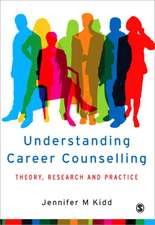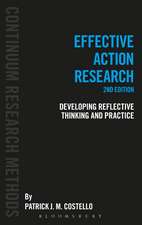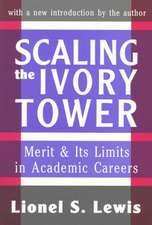When Power Corrupts: Academic Governing Boards in the Shadow of the Adelphi Case
Editat de Lionel S. Lewisen Limba Engleză Paperback – 16 apr 2018
When Power Corrupts details the conflict between the governing board and administration and faculty at Adelphi University in Garden City, New York, between 1985 and 1996. This conflict culminated in the removal of the Board of Trustees by the New York State Board of Regents. The new trustees in turn removed the president. Although the book focuses on board administration-faculty relations at one university, its findings have implications for almost all other institutions of higher learning in the United States. Lewis draws on the nearly 8,000-page transcript of the hearings of the Regents. These eleven volumes of exhibits include hundreds of documents obtained from individuals and organizations.
Lewis suggests that academic administrators have more control of governing boards than is generally recognized. Besides influencing who is asked to join a board, administrators may largely determine the information boards receive and on which they must make decisions. When faced with decisions, boards often defer to academic administrators or acquiesce to a campus president's suggestions. Because conflict over governance all too often takes precedence over academic work on American campuses, the implications for higher learning are profound. Faculty, academic administrators, members of governing boards, college students and their parents, and general readers concerned about problems relating to American higher education will find this book provocative and informative.
Lionel S. Lewis is professor emeritus of sociology and adjunct professor of higher education at SUNY/Buffalo. He has written more than 150 research articles, essays, and reviews. He is the author of Cold War on Campus: A Study of the Politics of Organizational Control and The Cold War and Academic Governance: The Lattimore Case at Johns Hopkins.
| Toate formatele și edițiile | Preț | Express |
|---|---|---|
| Paperback (1) | 184.91 lei 6-8 săpt. | |
| Taylor & Francis – 16 apr 2018 | 184.91 lei 6-8 săpt. | |
| Hardback (1) | 463.49 lei 6-8 săpt. | |
| Taylor & Francis – 30 apr 2000 | 463.49 lei 6-8 săpt. |
Preț: 184.91 lei
Nou
Puncte Express: 277
Preț estimativ în valută:
35.39€ • 36.56$ • 29.45£
35.39€ • 36.56$ • 29.45£
Carte tipărită la comandă
Livrare economică 25 martie-08 aprilie
Preluare comenzi: 021 569.72.76
Specificații
ISBN-13: 9781138517912
ISBN-10: 1138517917
Pagini: 206
Dimensiuni: 152 x 229 mm
Greutate: 0.45 kg
Ediția:1
Editura: Taylor & Francis
Colecția Routledge
Locul publicării:Oxford, United Kingdom
ISBN-10: 1138517917
Pagini: 206
Dimensiuni: 152 x 229 mm
Greutate: 0.45 kg
Ediția:1
Editura: Taylor & Francis
Colecția Routledge
Locul publicării:Oxford, United Kingdom
Cuprins
1: Introduction; 2: The President and His Board I; 3: The President and His Board II; 4: Lay Boards; 5: The Work of the Academic Governing Board; 6: The Diamandopoulos Years at Adelphi; 7: The Counterattack; 8: Conclusions
Descriere
William Schofield presents a classic analysis of mental illness, of professional psychotherapists and their training, and of the elements of psychotherapy. He asserts the need for more rigorous selection of candidates for therapy and for a properly focused training of a new professional specialist: the psychotherapist. In his new introduction to this important critique, Schofield shows why his pleas for a rational training program are still appropriate.Psychotherapy is a pioneering critique of modern psychiatric practices. Far too many people see psychotherapy as a cure for every ill from tormenting self-doubt to lack of zest of life. Through failure to attend to careful assessment of the presenting problem, and the nature (and neglect) of the applicant's social resources, the psychotherapist can fall unwittingly into the role of moral counselor or morale coach, and can be seduced into the chronic role of "best friend." Schofield argues that today's overburdened experts psychiatrists, clinical psychologists, and psychiatric social workers are not specifically trained to administer therapy through conversation. This book, first published in 1964, is an urgent call for a new specialist, a psychotherapist trained as a specialist in therapeutic conversation.This book is also a call for a more realistic public attitude toward mental disorder one which distinguishes emotional illness from unhappiness and discontent. Everyone interested in the growth, clarification, and evaluation of psychotherapy and counseling will be challenged by Schofield's arguments.

















